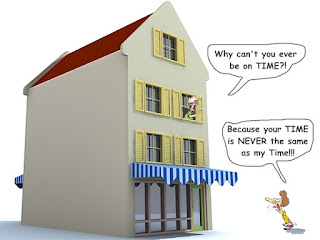It does a fairly good job of explaining how Time Dilation works, and how we can travel into the future but not into the past. Traveling into the past would require the creation of another you out of nothing, which is totally against all we know about science. (No, the universe wasn't created out of nothing. We just don't KNOW what was there just before the start of the Big Bang.)
Traveling into the future doesn't require creating another you. You travel 1 second into the future every second of your life.
In the PBS show, two of the experimenters take an atomic clock to the top of a mountain. After spending the night there, they compare their atomic clock to one at the bottom of the mountain. The clock on top of the mountain is 20 nanoseconds (billionths of a second) ahead of the clock at the bottom. So the two people who went up the mountain aged 20 microseconds more than the experimenter who stayed at the bottom of the mountain. OR, you might say that those who went up the mountain traveled 20 nanoseconds into the future.
Things get complicated and confusing when one of the people who went up the mountain talks about using binoculars to look at people at the base of the mountain and how, "technically, they are in the past." Are they? If they are in the past, then the experimenter who spent the night at the bottom of the mountain is also in the past as he meets the two who spent the night on the mountain. And the people who live at the bottom of the mountain will be in the past when the people who went up the mountain come down again and walk among them.
Who is in the past and who is in the future when everyone of us moves through time at a slightly different rate than everyone else?
If you think about it a bit (as I did overnight), you realize that if you stand on the street and yell back and forth with someone leaning out a window on the third floor of a building, that person is moving through time at a faster rate than you are. Yet, you can communicate with each other.
How can this be? It can be because of something I wrote about in my 2nd "scientific paper," which was titled "What is Time?" I wrote: "time is particle spin." If you are on the third floor, the particles that make up your body are spinning faster than the particles that make up my body down at street level. We are both in the "now," which means we can talk with each other even though time is going faster for you than it is for me.
The main problem is putting this into words that can be easily understood. Is it something that others have pointed out thousands of times before, or is this a new way to view Time?
Obviously, the person on "Genius" was wrong. You are not viewing people in the past when you stand atop a mountain and look through a telescope at people at the bottom of a mountain. You are both in the "here and now," even though time is moving at different rates for everyone.
I'm going to have to think about it some more. There's got to be a better way to describe this.


No comments:
Post a Comment